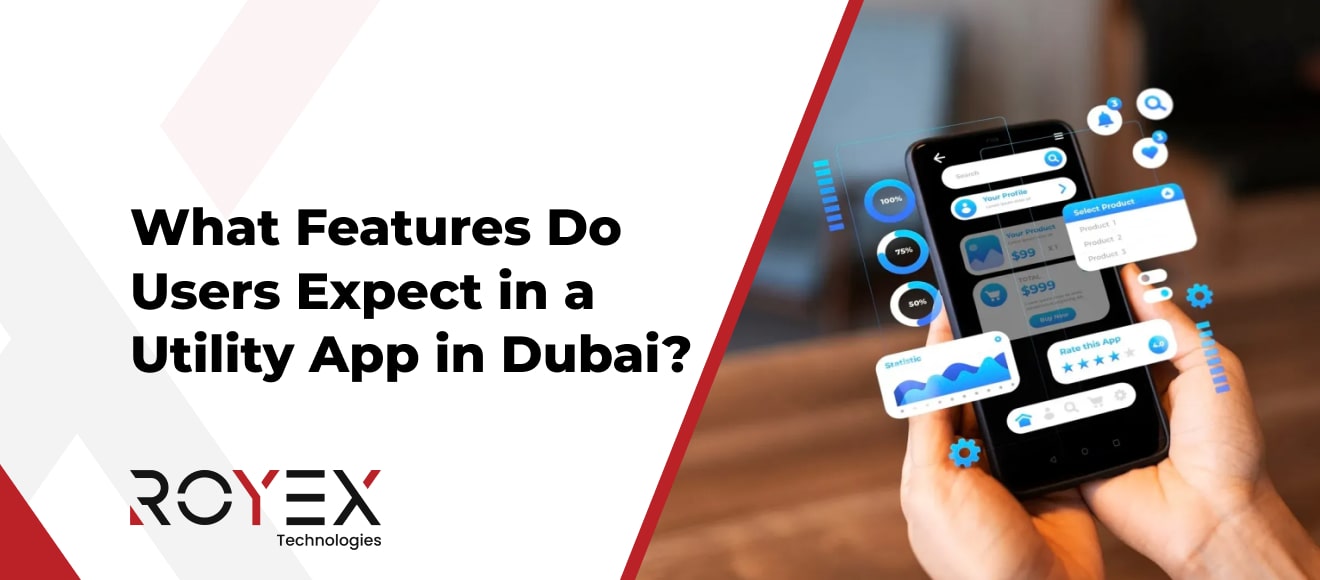
What Features Do Users Expect in a Utility App in Dubai?
Introduction
Dubai is one of the most tech-driven cities in the world. With residents and businesses relying heavily on digital solutions, utility apps (covering payments, services, government access, and lifestyle management) play a vital role in everyday life.
But what exactly do users in Dubai expect from a utility app? Based on market trends, digital adoption, and consumer expectations in the UAE, here are the must-have features every utility app should deliver.
1. Bilingual Support (English + Arabic)
-
Dubai is home to a multicultural population, with English widely spoken in business and Arabic as the official language.
-
Users expect bilingual interfaces so that they can switch between languages seamlessly.
-
Pro tip: AI-driven auto-translation can further personalize content.
2. Integration with UAE Digital Identity (UAE PASS)
-
Many government and financial services require secure identity verification.
-
Utility apps in Dubai are expected to integrate with UAE PASS, the national digital identity system.
-
This ensures trust, compliance, and faster onboarding.
3. Mobile Payments & Wallet Integration
-
Dubai is rapidly moving towards a cashless economy.
-
Popular payment expectations:
-
Apple Pay, Samsung Pay, Google Pay
-
Direct debit/credit card integration
-
Local gateways like Network International & PayTabs
-
Users also want secure e-wallets for instant top-ups, bill payments, and transfers.
4. Location-Based Smart Services
-
With Dubai’s focus on smart city initiatives, users expect apps to leverage GPS and geolocation for:
-
Nearest service center detection
-
Real-time public transport or taxi availability
-
Smart home or IoT integrations
5. Push Notifications & Smart Reminders
-
A strong utility app in Dubai must proactively remind users about:
-
Bill payment due dates
-
Upcoming events
-
Service renewals
-
Push notifications must be timely, relevant, and multilingual.
6. 24/7 Customer Support (Chat + AI Bots)
-
Dubai’s fast-paced lifestyle means people expect instant support.
-
AI-powered chatbots combined with live support ensure that issues are resolved anytime.
-
Multi-channel support (WhatsApp, in-app chat, email) is essential.
7. Secure Authentication & Data Privacy
-
With strict UAE data protection laws and GDPR compliance, users demand:
-
Two-factor authentication (2FA)
-
Biometric login (Face ID, fingerprint)
-
Data encryption for all transactions
-
Apps must balance security with user-friendly login experiences.
8. Offline Functionality
-
Many users want core features to work without internet access.
-
Example: A utility app for metro travel or parking should allow ticket viewing offline even if real-time updates need connectivity.
9. Service Integration & One-Stop Access
-
Dubai residents prefer all-in-one utility apps rather than downloading multiple apps.
-
Popular integrations include:
-
Bill payments (DEWA, Etisalat, Du)
-
Parking (RTA)
-
Government services (visa, fines, license renewals)
-
The “super app” model is becoming the norm.
10. Analytics & Personalization
-
Utility apps should go beyond transactions and provide value insights:
-
Monthly bill breakdowns
-
Usage history
-
AI-powered suggestions to save costs (e.g., electricity or telecom usage).
-
Personalization improves user engagement and retention.
Why These Features Matter in Dubai
Dubai users are digital-first, with one of the highest smartphone penetration rates in the world (96%+). They expect utility apps to be:
-
Fast – no lag or downtime
-
Simple – minimal clicks for maximum actions
-
Compliant – aligned with UAE digital laws
-
Innovative – offering AI-driven personalization
In a city that is positioning itself as the world’s smartest hub, only utility apps that combine functionality, convenience, and trust will thrive.
Conclusion
If you’re building a utility app in Dubai, focusing on local needs, regulatory compliance, and smart integrations is the key to success. Users expect apps to be multilingual, secure, payment-friendly, and packed with smart reminders and analytics.
To bring these features to life, you need an experienced partner who understands both AI-driven innovation and Dubai’s market requirements.
👉 Royex Technologies is a leading Mobile Apps Development company Dubai, with over a decade of experience delivering high-performance, secure, and user-friendly apps tailored for the UAE market. Whether you’re planning a utility app, e-commerce solution, or super app, Royex ensures your idea is transformed into a world-class mobile application.





